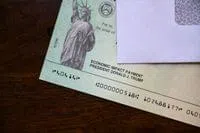The Internal Revenue Service is racing to reach these last recipients before a November 21 deadline, sending out nine million letters in September to people that may have potentially missed out on the $1,200 payments authorized by Congress earlier this year.
While most eligible Americans received the money automatically during the spring and summer, very low-income people who don’t normally file tax returns have to register online so the Internal Revenue Service knows how to reach them.
Roughly 12 million people fell into this category and it’s unclear how many of them still haven’t received their money. More than eight million people had registered online through October, but the Internal Revenue Service declined to say how many payments have gone out to non-filers or how many more have registered since it ramped up outreach.
Volunteers across the country have stepped up attempts to reach homeless individuals who may be eligible for the $1,200 payment but might not be aware or have a computer or smartphone they can use to sign up.
In Broward County, Florida, volunteer Richard Campillo spearheaded efforts that helped 220 homeless register online by setting up a computer lab at a meal center. But only about 30% of those have actually received the money, he said.
There are many reasons this could be, but the government’s online tool doesn’t usually explain why a payment is pending. It could take a phone call to the Internal Revenue Service’s hotline to find out why and even then, Campillo said, the agency still couldn’t verify one person’s identity.
“I think the IRS actually did a very good job. But now they have to finish the fight,” he said.
Some people are simply ineligible under the law, like those who were claimed as a dependent on a family member’s tax returns. Undocumented immigrants who don’t have Social Security numbers but pay Uncle Sam using a taxpayer identification number are also excluded from the payments, as well as their spouses.
Some bumps in earlier payouts
The agency sent money to more than 160 million people quickly, but the process was not without bumps along the way. Some dead people received payments by mistake before living people who were still waiting. Social Security recipients who are due extra money for a dependent had to take action before receiving the correct amount. And after the Internal Revenue Service sent some people debit cards loaded with their payment, there were reports of people unknowingly tossing them in the garbage because they were expecting a paper check.
“It’s clear the IRS was not equipped to meet this moment,” said Democrat Rep. Carolyn Maloney at a House Oversight hearing last month.
She said some of her constituents were still waiting for the money the government owed them and blamed Republicans in Congress for slashing the agency’s budget over the years.
The stimulus checks coincided with the height of tax return season, adding to the agency’s already heavy workload. Meanwhile, it had to shut down some of its in-person tax help locations because of the pandemic and a huge backlog of paper returns built up since many of its staff were working at home.
Still, a government oversight report found that the Internal Revenue Service calculated 98% of the payments it made through June correctly.
One more chance at tax-filing season
Those who miss the November 21 deadline can still get their stimulus money next year after they file their 2020 tax returns — but that would be an entire year after Congress established the program.
Lawmakers on both sides of the aisle have voiced support for sending a second round of stimulus payments, but they haven’t been able to agree on an overall economic package despite months of negotiations. It will likely be next year if and when Congress takes up a vote an another stimulus measure.
If a new stimulus bill includes a second round of payments, lawmakers have a chance to tweak the program. There’s evidence that state governments have information on about 75% of those at risk of missing the first round of payments because they either participate in SNAP or Medicaid, according to the Center on Budget and Policy Priorities. But Congress didn’t specify that data from those programs could be used the first time around.









